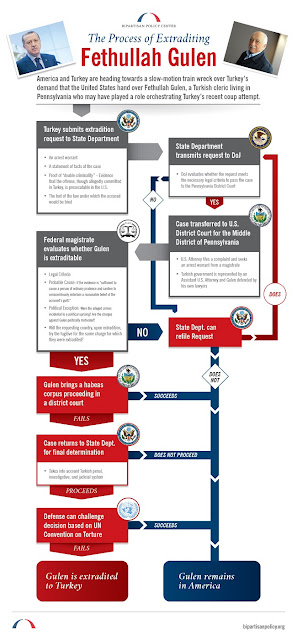Analysts say that if Turkey wants to prosecute Gulen, extradition is the only legal option. But the process involves far more than simply arresting an individual and loading him onto a plane. It could, in fact, take years.
Washington and Ankara cemented the Treaty on Extradition and Mutual Assistance in Criminal Matters in 1980, agreeing to “surrender to each other” individuals who have committed crimes punishable by at least a year in prison. In straightforward language, it sets out a series of conditions under which extradition may be approved or denied, and lays out the terms of the legal process involved.
 |
| Extradition process for Fethullah Gulen. (Image: Bipartisan Policy Center) |
The extradition process is lengthy and complex, involving multiple federal and local legal authorities. In the first step, the State Department (DOS) reviews the extradition request to ensure that it complies with the treaty, and then refers the request to the U.S. Justice Department (DOJ), which will determine whether Turkey has provided enough legal evidence to make a criminal case against Gulen.
In August, Turkish President Recep Tayyip Erdogan said he had shipped seven dozen boxes of evidence demonstrating how Gulen and his followers have, over the past 20 years, worked to incriminate their political enemies and undermine the Turkish government.
Justice lawyers are now sorting through those files, a process that could take many months, to make sure the evidence meets requirements of both the treaty and U.S. law. If satisfied that the evidence meets both treaty and U.S. law, they will forward the matter to the office of the U.S. attorney for the Middle District of Pennsylvania, who would seek an arrest warrant through a U.S. judge in the same district.
If the judge agrees to issue a warrant, law enforcement officers would arrest Gulen and bring him before the judge. If the judge believes Turkey has presented its case, he would issue an extradition order for the Secretary of State to consider. While Gulen would not be able to appeal the decision, his lawyers would have a means to challenge it.
The State Department would have final say in the matter. Sticking points would include concerns, for example, over whether Turkey would treat Gulen humanely or give him a fair trial. The U.S. would examine Turkey’s rights record on torture, for example, and has the right to set conditions for Gulen’s surrender.
If the secretary of state decides to extradite, the DOS would communicate with Ankara to determine the date, time and place for Gulen's handover.
Turkey is pushing for quick extradition, suggesting that U.S.-Turkish relations are at stake. But the burden of proof rests squarely on Ankara, and if it cannot sufficiently prove its accusations against Gulen, the extradition request will be refused.
Published on Voice of America, 13 September 2016, Tuesday
Related
